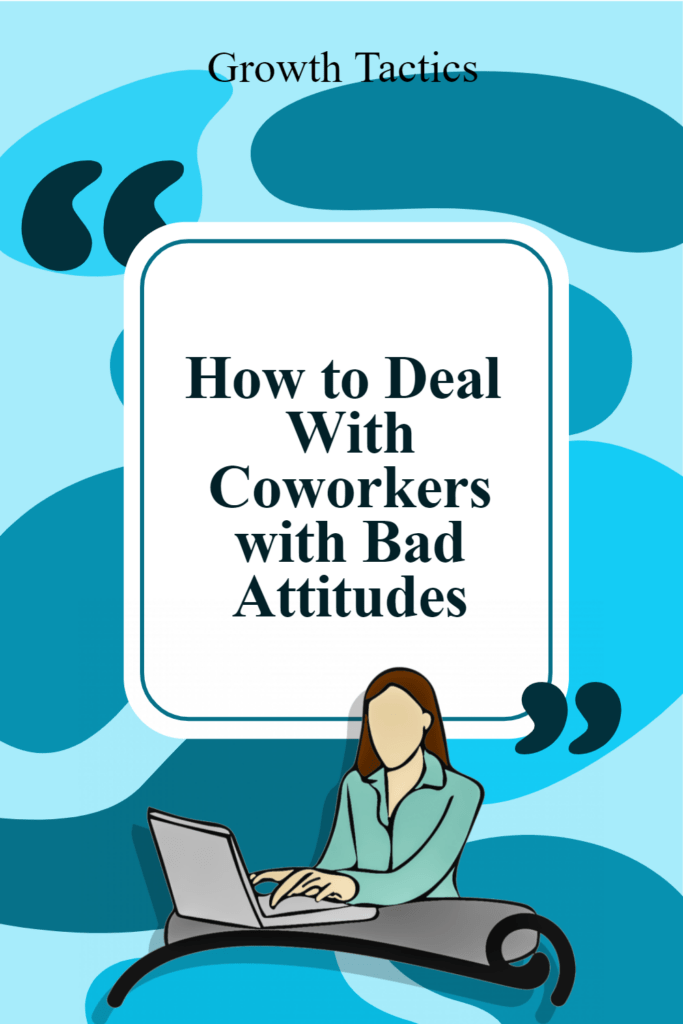We’ve all been there! Stuck working beside a colleague with a bad attitude who brings negativity into the workplace. Whether gossip, constantly complaining, or just plain difficult behavior, dealing with negative coworkers is an unfortunate reality in many work environments. Though these situations can be incredibly frustrating, there are effective strategies you can use to manage difficult colleagues.
In this comprehensive guide, we’ll explore actionable tips on how to deal with coworkers with bad attitudes professionally. You’ll learn strategies to set boundaries, improve communication, enlist support, and focus on the positives. With the right techniques, you can limit a colleague’s toxic impact and accelerate your productivity and professional growth. Read on to gain insight into common difficult coworker types and learn specifics on how to deal with workplace negativity. Arm yourself with this knowledge to maintain morale, avoid conflict, and thrive alongside challenging personalities.
Understand Their Perspective
Try to see things from your negative coworker’s point of view. There may be valid reasons behind their attitude that you are unaware of. Listen to their concerns without judgment and validate their feelings while remaining professional.
For example, if a coworker seems irritable, it could be because they feel overworked or undervalued. Take a moment to listen to them and acknowledge their perspective, it can help diffuse the negativity. Let them vent a little, without encouraging constant complaining.
Simply saying “I understand this is a frustrating situation for you” can go a long way. It shows you care about their viewpoint, even if you don’t fully agree with it. Validating their emotions takes the wind out of the negativity sails while still maintaining professionalism.
Set Clear Boundaries

It’s important to set clear boundaries with coworkers who exhibit negative attitudes. Define what behaviors or comments are unacceptable and explain how their attitude affects your work and the team overall. For example, “When you make critical comments about my work in front of others, it undermines my role on the team. I would prefer if you came to me directly with any concerns.”
Be direct but also compassionate. Understand they may be going through personal difficulties and frame the conversation as wanting to maintain a respectful and productive work environment. Make it clear you want to move forward collaboratively. Professionally setting boundaries, without being aggressive or passive, can help refocus the relationship.
Limit Your Exposure
Limiting exposure to a difficult coworker’s negativity is essential for maintaining positivity. When possible, avoid engaging in unnecessary interactions that provide openings for toxicity. If a colleague starts gossiping or complaining, politely disengage or steer the conversation to more constructive topics. Focus your interactions on work matters rather than personal venting. You can still be cordial and professional without overexposing yourself. Setting clear boundaries helps minimize the impact one person’s bad attitude can have on you and the workplace. Remain focused on your own goals and responsibilities, rather than getting sucked into drama. This protects your morale and productivity and models the right behavior for others.
Don’t Take It Personally
When dealing with a coworker with a bad attitude, it’s important not to take their behavior personally. Remember that their negativity likely stems from personal issues or problems outside of work. Don’t let their attitude affect your self-worth or make you feel like you are the problem.
Remind yourself that you can’t control their actions or attitude. You can only control how you respond to them. Avoid internalizing their negativity by realizing it says more about them than you. Understand that even though you work together, you don’t have to be friends or get along perfectly. As long as you remain professional and focus on your job, you don’t have to let a difficult coworker impact your self-esteem or self-image.
Remember that you have value as an employee and a person, regardless of how coworkers treat you. Don’t take their behavior to heart or let it make you doubt yourself. As much as possible, detach yourself emotionally from the situation and recognize that their bad attitude is their issue to work through. Maintain your positivity and sense of self-worth.
Focus on the Positive

Surrounding yourself with positive coworkers can help boost your mood and motivation. When possible, collaborate with colleagues who have upbeat attitudes. Their optimism can be contagious.
Also, don’t forget to credit yourself for your strengths and accomplishments. Make a list of your recent wins, large and small. Reflect on your proven abilities, knowledge, and skills. This can help counteract any negativity directed your way.
Maintaining a solutions-focused mindset is key. When faced with a difficult co-worker, shift your mindset from the problem to the solution. Think about how the situation could be improved and stay focused on achieving that. Avoid dwelling on what’s wrong. A constructive perspective will help you handle workplace challenges.
Enlist Support When Needed
Dealing with difficult coworkers is challenging, you don’t have to handle it alone. If problems persist despite your best efforts, consider involving others who can help:
- Your Manager: Your manager is responsible for ensuring a professional, harassment-free workplace. Calmly explain how your coworker’s behavior impacts your work and ask your manager for guidance in improving the situation. They may be able to have a direct conversation with the problematic coworker or make adjustments to limit your interactions.
- Mentors/Trusted Colleagues: Confide with a mentor or trusted colleague about the issues. They may have insight into productive ways to handle difficult coworkers based on their experiences. Don’t gossip, but lean on your support system for advice and encouragement.
- HR: If your company has an HR department, you can confidentially seek guidance on dealing with your difficult coworker constructively. HR can provide coaching on communication strategies, conflict resolution approaches, and your options if the behavior persists. They’re there to help resolve workplace disputes.
You don’t need to struggle alone with a difficult coworker. Seek support from your manager, mentors, HR, or others you trust. You can find an effective approach to improve the situation with their guidance.
Improve Your Communication Skills
Having strong communication skills can help you navigate challenging interactions with difficult coworkers. Consider taking courses on emotional intelligence or conflict resolution. These will teach you to understand coworkers’ perspectives and needs while asserting boundaries. Role-playing challenging scenarios with a trusted friend can also help you prepare responses and reactions ahead of time. Stay calm in heated moments by taking a breath before responding. Ask clarifying questions if you’re unsure of the root issue. And learn strategies for diffusing negativity – don’t match your coworker’s aggressive tone, but respond professionally. You can become more adept at having difficult conversations while maintaining composure with practice. This will make you better equipped to deal productively with negative attitudes in your workplace.
Focus on Your Work
When dealing with difficult coworkers, it’s important not to let their negativity derail your productivity or professional growth. Here are some tips:
- Set challenging goals for yourself. Identify skills you want to build or projects that excite you. Pursuing professional development and engaging work can help insulate you from the toxicity of others.
- Demonstrate professionalism through your work. Be a model employee – show up on time, meet deadlines, and produce excellent work. Don’t get sucked into unprofessional behavior.
- Don’t drop the ball on your responsibilities or let your work suffer because of a difficult coworker. You want your reputation to remain untarnished.
- Find ways to tune out negativity and gossip. Listen to music, put headphones on, or move away from the person when possible. Refocus on your tasks.
- Accentuate the positive. When you complete a project or milestone, take a moment to appreciate your accomplishment. Don’t dwell on the actions of others.
- Collaborate with supportive colleagues who bring out your best. Surround yourself with positive people when you can.
- Set boundaries around how much you engage with the difficult person. Limit your interactions or have discussions in a neutral location with others present.
The key is to stay focused on your development and contributions. Don’t let their attitude sidetrack you. Maintain your productivity, pursue your goals, and continue developing your skills.
Conclusion
In summary, dealing with difficult coworkers is challenging but manageable. The keys are understanding their perspective, setting boundaries, limiting exposure, focusing on positives, enlisting support, honing communication skills, and staying focused on your work.
Addressing problematic dynamics is important because negativity spreads and hurts productivity and morale. With some empathy, assertiveness, and detachment, you can maintain professionalism and avoid needless conflict.
Parting advice: don’t let others diminish your self-worth or passion. Remain solution-focused and keep the big picture in mind. Organizations thrive when employees collaborate, so do your part to foster a respectful climate. With patience and wisdom, you can rise above petty issues. Stay focused on your growth and goals. You’ve got this!


